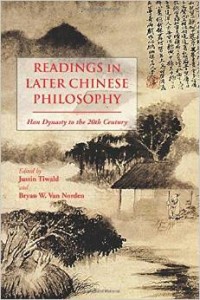The Manchester Centre for Political Theory will host a workshop on Confucian political theory on September 11-13. The deadline to apply is May 26. Graduate students and faculty emeriti will, upon acceptance, be able to apply to the Centre for funding. More information is here.
Author Archives: Justin Tiwald
Dissertation Workshops on Comparative Political Theory
Shortly before the next American Political Science Association meeting in San Francisco, the organization will host dissertation workshops, one of which is devoted to students working in comparative political theory. The workshops group six ABD students together with two scholars. The deadline to apply is May 15. The workshops will take place on August 30, the day before the main APSA meeting commences. More information is here.
April 15 Deadline for Bay Area Conference on Chinese Thought
Just a quick reminder that the deadline for the Bay Area Conference on Chinese Thought (BACCT) is April 15. The event will take place at UC Davis on October 14-15. More information below!
Thor Harris and I are pleased to announce the inaugural meeting of the Bay Area Conference on Chinese Thought (BACCT), which will meet annually at various Bay Area institutions of higher education beginning in 2017. BACCT is modeled on the highly successful regional cross-disciplinary conference series on Chinese thought in the Northeast and Midwest. Like those, the aim is is provide a forum for scholars to present their work, develop networks with other scholars in the area, and examine issues in Chinese thought from different disciplinary perspectives. Although the conferences will be held in the Bay Area (broadly construed), all scholars of Chinese thought are welcome to attend.
Individual presentations will likely be twenty minutes in length, grouped into panels that will aim to bring out inter-disciplinary connections. Continue reading
Review of Pang-White’s handbook of Chinese philosophy & gender
Here is Sarah Mattice’s review of Ann Pang-White’s Bloomsbury Research Handbook of Chinese Philosophy and Gender, published in Hypatia Reviews Online.
CFP: 1st Annual Bay Area Conference on Chinese Thought
Thor Harris and I are pleased to announce the inaugural meeting of the Bay Area Conference on Chinese Thought (BACCT), which will meet annually at various Bay Area institutions of higher education beginning in 2017. BACCT is modeled on the highly successful regional cross-disciplinary conference series on Chinese thought in the Northeast and Midwest. Like those, the aim is is provide a forum for scholars to present their work, develop networks with other scholars in the area, and examine issues in Chinese thought from different disciplinary perspectives. Although the conferences will be held in the Bay Area (broadly construed), all scholars of Chinese thought are welcome to attend.
Individual presentations will likely be twenty minutes in length, grouped into panels that will aim to bring out inter-disciplinary connections. Continue reading
New Book: Dao Companion to the Philosophy of Xunzi

I am pleased to share the news that Eric Hutton’s much-anticipated Dao Companion to the Philosophy of Xunzi has been published. Click here for more information and to download the back matter and front matter for free (this includes the introduction).
A list of chapters and contributors is below the fold.
Another Round on Chinese Thought as Philosophy
In case you missed it, Nicholas Tampio recently published a short piece in Aeon explaining why he thinks Confucius (among other non-Western thinkers) should not be regarded as a philosopher, with implications for the philosophy curriculum and the makeup of philosophy faculties. This is a response to the recent New York Times piece by Jay Garfield and Bryan Van Norden. Tampio and Van Norden subsequently exchanged tweets on the topic. Amy Olberding replies thoroughly and with humor here, and Ethan Mills responds on behalf of Indian philosophy here.
Where to begin?
Postdoc at City University of Hong Kong
City U’s Centre for East Asian and Comparative Philosophy is advertising a postdoc that will be of interest to readers of this blog. I’ll post some highlights below the fold and then link to the complete listing.
In Memoriam: David S. Nivison (1923-2014)
American sinologist and philosopher David Nivison passed away on the 16th of this month. Nivison was a true polymath and made tremendous contributions to a variety of fields that overlapped with Chinese thought and history. For most readers of this blog, he will perhaps be best remembered for his contributions to Chinese philosophy, which was greatly enriched by his work on Daoists and Confucian philosophers across history, including the classical period as well as the Song, Ming and Qing dynasties. For much of his adult life, he also served as one of a small handful of scholars working on Chinese thought under the aegis of a Western philosophy department, and played a major role in integrating Chinese philosophy with contemporary philosophy as practiced in the English-speaking world. Among his best-known books are The Life and Thought of Chang Hsueh-ch’eng, The Ways of Confucianism, and The Riddle of the Bamboo Annals.
There are two substantial obituaries available on-line. One in English and the other in Chinese. The latter includes a nice collection of photographs.
New Book: Readings in Later Chinese Philosophy
 I’m pleased to announce the publication of our reader in post-classical Chinese philosophy.
I’m pleased to announce the publication of our reader in post-classical Chinese philosophy.
I’ll put the details below the fold, but it might help to have a quick summary of some the book’s most noteworthy (or at least distinctive) advantages.
- Better selections than Chan’s Sourcebook, including several overlooked gems and works on and by women
- Consistent translations of key terms and oft-quoted passages
- Begone Wade-Giles!

